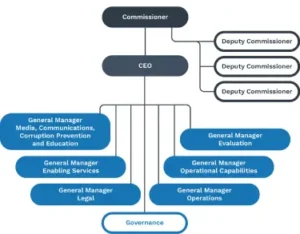Description: NACC
Explore if Australia’s National Anti-Corruption Commission (NACC) effectively holding politicians accountable and safeguards public trust.
Is the National Anti-Corruption Commission Protecting Politicians?
Introduction
The National Anti-Corruption Commission (NACC) was set up with the promise of ensuring transparency and accountability in Australian politics. However, there is growing concern that the NACC is not fulfilling its mandate effectively. Instead of being a watchdog, it appears to protect politicians, raising questions about its role and impact on public trust. This article delves into the NACC’s performance, controversies, and the belief that politicians are treated as a “protected species.”
The Role and Mandate of the NACC

The NACC was created to investigate and address corruption within government bodies, including elected officials, public servants, and corporations. Its mandate includes:
1. Investigating Allegations: Handling complaints and conducting investigations into suspected corruption.
2. Promoting Integrity: Encouraging ethical conduct within government institutions.
3. Public Awareness: Increasing public understanding and awareness of corruption and its impacts.
Comparison with Similar Bodies
Compared to anti-corruption bodies in other democracies, such as the UK’s National Crime Agency (NCA) or the US Office of Government Ethics (OGE), the NACC was expected to offer a robust framework for maintaining integrity in Australian politics. The NCA and OGE are known for their stringent actions and high success rates in corruption cases. However, it is essential to recognize that corruption is still a significant issue even in countries with established anti-corruption bodies.
Initial Promises and Public Expectations

Upon its establishment, the NACC was hailed as a game-changer for political accountability in Australia. Key promises included:
1. Rigorous Investigations: Thoroughly investigating all allegations of corruption.
2. Transparency: Keeping open communication with the public about ongoing investigations and outcomes.
3. Fairness: Ensuring that no individual, regardless of position, is above the law.
Public Expectations
The Australian public hoped the NACC would lead to a new era of political transparency, where corrupt practices would be swiftly found and addressed. Expectations were high, with many believing that the NACC would serve as a powerful deterrent against unethical behaviour.
Performance of the NACC to Date
Activities and Investigations
Since its start, the NACC’s performance has been mixed. Key statistics include:
1. Investigations Initiated: A significant number of investigations have been launched.
2. Completed Investigations: However, the completion rate of these investigations is still low.
3. Actions Taken: Very few investigations have led to meaningful actions or penalties.
These statistics highlight a critical gap between the NACC’s intended role and its actual performance. Despite many investigations, the lack of substantial outcomes suggests potential inefficiencies or systemic issues within the NACC.
Investigations Involving Politicians
Specific Examples
 The NACC has faced criticism for its handling of several high-profile cases involving Australian politicians. Here are some notable examples:
The NACC has faced criticism for its handling of several high-profile cases involving Australian politicians. Here are some notable examples:
1. Former Prime Minister Scott Morrison: Allegations surfaced about misuse of public funds and failure to adhere to proper governance standards. Key concerns included:
– Sports Rorts Affair: Accusations of misallocating sports grants to marginal seats for political gain. This scandal highlighted how public funds could be strategically used for electoral advantages, undermining the principles of fair governance.
– COVID-19 Fund Allocation: Criticisms about the distribution of COVID-19 relief funds favouring certain electorates. The allocation process was perceived as biased, raising questions about the fair distribution of resources during a national crisis.
– Secret Ministries Scandal: Morrison’s appointment to multiple ministries without public disclosure, raising concerns about transparency and accountability. This unprecedented move sparked debates on the concentration of power and the need for transparency in government appointments.
2. Ministers in Morrison’s Cabinet: Several ministers under Morrison’s leadership were also embroiled in controversies:\
– Bridget McKenzie: Central figure in the Sports Rorts Affair, accused of using public money to fund projects in marginal seats. McKenzie’s involvement in the scandal further highlighted the misuse of public funds for political gains.
– Angus Taylor: Faced allegations of misleading Parliament about the City of Sydney’s travel expenses and his involvement in environmental policy breaches. Taylor’s case underscored issues of integrity and honesty within the government.
– Stuart Robert: Accused of conflict of interest and misuse of public money in various departmental dealings. Robert’s actions raised serious ethical questions about the conduct of public officials.
3. Other High-Profile Cases:
– Peter Dutton: Accusations of giving community safety grants to marginal seats for political advantage. Dutton’s actions were seen as another example of using public funds for electoral benefits.
– Sussan Ley: Faced criticism for travel expenses and use of public funds for personal benefit. Ley’s case brought attention to the need for strict oversight on the use of public money by officials.
Outcomes

The lack of significant penalties in these cases has led to widespread criticism that the NACC is too lenient towards politicians, contributing to the belief that elected officials are above the law. The handling of these high-profile cases raises questions about the NACC’s ability to enforce accountability and support public trust in the political system.
Criticism and Controversies
The NACC has faced substantial criticism for its perceived ineffectiveness. Key controversies include:
1. Bias Allegations: Claims that the NACC is biased in favour of high-ranking officials. These allegations suggest that the NACC may be influenced by political pressures, undermining its independence and credibility.
2. Inaction: Multiple instances where clear evidence of corruption did not lead to meaningful action. This inaction has led to frustration among the public and calls for reforms within the NACC.
3. Lack of Transparency: The NACC’s communication with the public is often seen as insufficient and opaque. Transparency is crucial for building public trust and ensuring accountability.
Comparative Analysis with Other Anti-Corruption Bodies
Effectiveness Comparison
While the UK’s National Crime Agency (NCA) and the US Office of Government Ethics (OGE) are often cited as robust anti-corruption bodies, it’s essential to recognize that no country is immune to corruption. Both the UK and the US have their share of high-profile corruption cases, suggesting that the mere presence of an anti-corruption body does not end corruption.
1. UK National Crime Agency (NCA): The NCA is known for its stringent actions and high success rate in corruption cases. However, the UK has faced significant corruption scandals, such as the MP expenses scandal and various financial sector frauds. These incidents highlight ongoing challenges in keeping political and corporate integrity.
– MP Expenses Scandal: This scandal revealed widespread abuse of the parliamentary expenses system, leading to several MPs being charged and convicted. It underscored the need for strict oversight and transparency in public spending.
– Financial Sector Frauds: The UK has also seen major financial scandals, such as the LIBOR manipulation case, where major banks were found to have manipulated interest rates for profit. This case highlighted the pervasive nature of corruption within the financial sector and the need for robust regulatory frameworks.
2. US Office of Government Ethics (OGE): The OGE maintains a high level of transparency and accountability. Yet, the US has also seen many corruption cases, from lobbying scandals to accusations of misuse of public office, as seen in the cases involving former President Donald Trump’s administration and various state officials.
– Lobbying Scandals: The influence of lobbyists in the US political system has been a long-standing issue, with many cases highlighting how corporate interests can unduly influence policy decisions. This raises concerns about the integrity of the democratic process.
– Misuse of Public Office: High-profile cases, such as the allegations against former President Trump about the misuse of office for personal gain, illustrate the challenges in keeping ethical standards at the highest levels of government.
Corruption Levels and Public Perception
While anti-corruption bodies in the UK and the US are designed to tackle corruption, these countries still face substantial corruption issues:
1. United Kingdom: High-profile corruption cases in recent years, such as the lobbying scandal involving former Prime Minister David Cameron and the expenses scandal involving many MPs, show that corruption is still a significant concern. Transparency International’s Corruption Perceptions Index (CPI) often places the UK in a relatively favourable position, but public perception of corruption is still critical, especially about political elites and corporate influence.
– David Cameron Lobbying Scandal: Cameron faced accusations of lobbying for Greensill Capital, a financial firm, which highlighted potential conflicts of interest and the revolving door between politics and business. This scandal brought attention to the need for stricter lobbying regulations.
2. United States: The US has experienced major corruption scandals involving both political and corporate actors. Cases like the Watergate scandal, the Enron collapse, and more recent controversies involving high-ranking officials show that corruption is a persistent issue. Despite the efforts of the OGE and other agencies, the US still grapples with public distrust in its political system, worsened by frequent revelations of unethical behaviour.
– Watergate Scandal: One of the most infamous political scandals in US history, Watergate involved a break-in at the Democratic National Committee headquarters and the later cover-up by the Nixon administration. This scandal led to President Nixon’s resignation and highlighted the importance of accountability and transparency in government.
– Enron Collapse: Enron’s bankruptcy due to widespread corporate fraud and corruption had a significant impact on public trust in corporate governance and led to the implementation of stricter regulatory measures, such as the Sarbanes-Oxley Act.
Implications for Australia
In comparing Australia’s NACC with its counterparts, it’s essential to consider:
1. Effectiveness of Investigations: The mere existence of an anti-corruption body is not enough; its effectiveness in conducting thorough investigations and imposing meaningful penalties is crucial. The NACC must ensure that it can operate independently and without political interference to achieve its mandate.
2. Public Trust: Keeping public trust requires transparency, consistent enforcement of anti-corruption laws, and accountability for all, including high-ranking officials. The NACC should prioritize building and keeping public trust through open communication and transparent processes.
3. Learning from Others: While the UK and US face their challenges, examining their anti-corruption practices can offer valuable lessons. For instance, enhancing transparency and independence in investigations could bolster the NACC’s effectiveness. Adopting best practices from other countries can help strengthen the NACC’s framework and improve its outcomes.
Recommendations for Improvement
Experts suggest several improvements for the NACC:
1. Increased Independence: Ensuring the NACC runs independently from political influence is crucial for its credibility. This could involve setting up clear boundaries and safeguards to prevent political interference in investigations.
2. Greater Transparency: Enhancing transparency in investigations and outcomes can help restore public trust. The NACC should provide regular updates on its activities, publish detailed reports on completed investigations, and be transparent about its decision-making processes.
3. Stronger Mandates: Expanding the NACC’s powers to ensure more effective action against corruption. This might include granting the NACC greater authority to enforce penalties, conduct independent audits, and access necessary resources for thorough investigations.
4. Public Engagement: Actively engaging with the public to gather feedback and ensure that the NACC’s efforts align with public expectations. This could involve public forums, surveys, and partnerships with civil society organizations to promote transparency and accountability.
Conclusion
The National Anti-Corruption Commission was set up with high hopes of increasing political accountability in Australia. However, its performance to date raises concerns about its effectiveness. Addressing these issues is crucial for restoring public trust and ensuring a transparent, accountable political system.
Question for Readers
Do you believe the National Anti-Corruption Commission is fulfilling its role effectively?
Call to Action
Join the conversation and advocate for a stronger, more transparent anti-corruption framework. Share your thoughts and push for reforms that hold our politicians accountable.
Social Sharing
If you found this article insightful, please do share it with your contacts and on social media.

